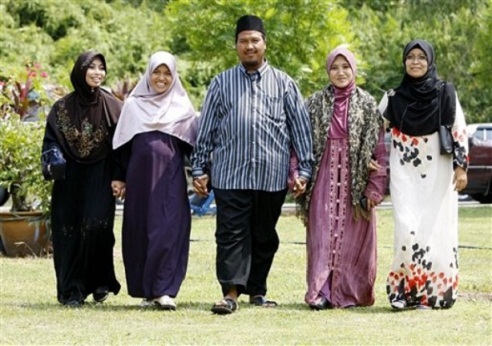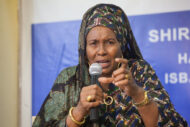“I first learned the concepts of non-violence in my marriage.”— Mahatma Gandhi
“Love is blind, but marriage restores its sight.” — Georg C. Lichtenberg
“My advice to you is to get married. If you find a good wife, you`ll be happy; if not, you`ll become a philosopher.” — Socrates
“Second marriage: the triumph of hope over experience.” — Samuel Johnson
One way of looking at the institution of marriage is through the historical eyes of creation (man), but another way of looking at it is through the words of the Creator.
One of the most often asked question by non-Muslims and inquiring (but uninformed) Muslims concerns having more than one wife (polygamy). This is sometimes the enticement for some to convert (others say revert) to Islam, and for others to become an even more “practising” Muslim. Hmmm.
The interest in the “multiple wives club”, from such people, is less from an inquiring theological connection or history seeking mind, but seems more from the immediate gratification associated with the libido and fantasy desires. This is further perpetuated by the stereo-typing info-tainment media andHollywood.
Is this an observation or a judgment?
(Query: It would be interesting to know which Muslim country (possibly an incorrect statement) has the most polygamists: Saudi Arabia? Egypt?Indonesia? Malaysia? Nigeria? Put differently, is this an Arab and/or Asian/African phenomenon? Furthermore, is it more common amongst the wealthier/literate or poorer/illiterate Muslims?)
It is somewhat surprising the anti-shariah movement has not yet pounced on the conversions, as part of their arguments, for “shariah creep” or backdoor conversions.
The concept of polygamy is found in other religions and traditions including Mormonism. However, it is mostly identified with Islam in the minds of, say, Westerners. But, identified without truly understanding the wisdom and the clear pre-conditions for “approval” from the Creator concerning polygamy.
Revelation, responsibility and reality
First, a little a background is necessary to better appreciate the multiple wives scenario within Islam. The Quran and Islamic (shariah) law, unlike many traditions and cultures of the time, sought to control and regulate the number of wives rather than give man the free “licence of lust” without the corresponding responsibility.
In order for us to understand the Quranic texts, we have to see the ruling about polygamy in context. In seventh-century Arabia and in distant lands, a man could have as many wives as he chose and to prescribe to only four was an unhappy limitation.
For a Muslim, there is no ambiguity in Surah Nisa 4:3, as it`s very simple and clear message from the Creator:
If ye fear that ye shall not be able to deal justly with the orphans, Marry women of your choice, Two or three or four; but if ye fear that ye shall not be able to deal justly (with them), then only one, or (a captive) that your right hands possess, that will be more suitable, to prevent you from doing injustice. Surah Nisa 4:3 Yosuf Ali
It should be noted, the Quran permits but does not command a man to have four wives.
Furthermore, another Ayah, Al Baqarah 2:228, states:
And they (women) have rights (over their husbands as regards living expenses) similar (to those of their husbands) over them (as regards obedience and respect) to what is reasonable, but men have a degree (of responsibility) over them. And Allaah is All-Mighty, All-Wise.
There are two words that stand out here: equality (in treatment) and responsibility (maintenance).
Finally, the Prophet (SAW) is reported to have said: “Among the Muslims the most perfect, as regards his faith, is the one whose character is excellent, and the best among you are those who treat their wives well.” Al-Tirmidhi Hadith 628.
Equal treatment possible?
As stated above, the Quran stipulates that a man is responsible for the maintenance of his wife or wives. If a man has more than one wife, he has to provide separate living accommodation for each of his wives.
Therefore, multiple marriages are a heavy responsibility, financially and otherwise, on the man. It is not a superficial pleasure trip laden with all kinds of sexual exploits involving a man and his wives altogether.
(Where does the “controversial” Obedient Wives Club (OWC), an “…international Islamic faith-based organisation which claims to promote harmonious families by teaching wives how to be submissive to their husbands…”, fit in within the Creator`s conditional permissibility of allowing multiple wives? Furthermore, its provocative book, “Islamic Sex, Fighting Jews to Return Islamic Sex to the World”, “… which encouraged wives to act like `first-class whores` in order to keep husbands from straying…” caused much chatter, possibly for the worse for women?)
In Islam, such activity is not permissible. A man must divide his time equally among his wives. He may, for example, spend one night with each wife on a rotating schedule. If a man cannot maintain justice in the equal treatment of his wives, the Quran then stipulates that he is to have no more than one wife.
(Thus, a mortal Muslim man cannot have a favourite wife as that would violate the rule of equality.)
Muslims regard this Quranic permission as strengthening and raising the status of women and the family. It ensures the welfare of single woman and widows in a society whose male population was diminished by, say, warfare, and to curb unrestricted polygamy.
Thus, given such a scenario during the challenging time period, the woman would have option be a “co-wife” or be a “no wife”.
Conclusion
There are some, Muslims and non-Muslims, who say Islam is a male-dominant religion or female-repressive religion, and, often use the example of four wives to highlight their point. The Obedient Wives Club may perpetuate and accentuate the perception.
Let`s put aside that the multiple wives option has been mistreated by some like in accounting terms LIFO (last in, first out) and FIFO (first in, first out), where the magical number of (up to) four is maintained. Obviously, that violates both the spirit and rule of mercy from the Creator.
Let`s also put aside that a distinction must be made between Islam (the religion) and Muslims (influenced by culture), as the truth is with the former and the “wives` tale” rests with the latter.
Thus, for a Muslim to be part of the “multiple wives club”, the thresholds, as set down by the Creator, are very high, and they also act as an equalizer for women.
So, the next time [a male] comments, with a cheeky grin, “…you Muslims are so lucky to be able to have up to four wives …” the reply may start with the historical reference, then move on the clear-cut ordained responsibilities and pre-conditions, and conclude by saying marriage, in Islam, is not a “sexual exchange”.
Romantic dinner for five — polygamy on the rise inMalaysia


In this Aug. 15, 2009 photo, polygamist Mohammad Inaamulillah Bin Ashaari, center, is shown with his four wives, from left, Rohaiza Esa, Ummu Habibah Raihaw , Nurul Azwa Mohd Ani,and Ummu Ammarah Asmis at the “Ikhwan Polygamy Club Family Day” in Rawang, north of Kuala Lumpur, Malaysia. Polygamy is legal for Muslims in Malaysia, though not widespread. The Ashaari clan believes it should be. Last month, the sprawling family launched a Polygamy Club that seeks to promote plural marriages for what it says are noble aims, such as helping single mothers, prostitutes and older women find husbands.
Rohaya Mohamad, a 44-year-old Malaysian doctor, chats happily about her plans for the evening, a romantic dinner for five with her husband — and his three other wives.
Rohaya and her family, which has produced 17 children aged between seven and 21, are among growing numbers of Malaysians entering into polygamous marriages, a phenomenon that observers say is linked to rising “Islamisation”.
Critics say that the practice, legal for Muslims who make up 60 percent of the multi-ethnic population, is out of step with modern times and that it degrades the lives of women and children.
But Rohaya and her fellow wives say the arrangement works just fine for them, allowing them to easily juggle childcare, domestic duties and careers in their busy households.
The undisputed head of the family, 43-year-old husband Mohamad Ikram Ashaari, shuttles between the women`s separate homes, spending a night with each in rotation before they join up on the weekends for family time.
He has taken a new wife every five years, starting with Juhaidah Yusof, a softly spoken 41-year-old who takes care of all the youngsters, and concluding with pretty 30-year-old Rubaizah Rejab, an Arabic language teacher.
His second wife, divorce lawyer Kartini Maarof, introduced him to number-three Rohaya — who had sought the lawyer`s services while divorcing her first husband, with whom she had seven children.
“She could see how busy I was so she offered me her husband. Initially I said no as I didn`t want to hurt her… and my dad was really against it because polygamy has never been seen in a positive light,” she says.
The family, part of the controversial Ikhwan Polygamy Club which says its mission is to improve the reputation of multiple marriage, believes it is a cure for social ills like adultery and pornography.
“Men by nature are polygamous, they have girlfriends and mistresses, they visit prostitutes — it is normal,” says Rohaya. “God has made men like that.”
“But in Islam there is a way out which means you must be responsible for the women you want to be involved with.”
They shrug off criticism that the club has its roots in Al-Arqam, a group banned by the Malaysian government which called it an illegal Islamic sect.
There has been particular controversy over plans to spread the club abroad, with branches in Indonesia to add to its network of 1,000 members acrossSoutheast Asia, Australia, the Middle East and Europe.
Mohamad Ikram is a director with Global Ikhwan, a company whose diverse activities include restaurants and noodle manufacturing and which also manages the club.
“We want to say that polygamy works if you follow the rules of God. We don`t expect people to follow but we want to change the mindset,” says Rohaya.
The women say that in such a big household, friction is inevitable but they have learned to resolve their problems.
“It`s a big family so it`s normal that sometimes we argue, sometimes we get on, sometimes we get jealous,” says Kartini.
The four wives seem to have an easy rapport with each other and their offspring, who troop in from school dressed in traditional flowing outfits before touching their foreheads to the hand of a visitor in a polite greeting.
But sociologist Norani Othman from pressure group Sisters in Islam says that these educated women and thriving children are not the typical polygamous family.
She says the practice`s original purpose has been warped, and that the strict conditions to ensure women are fairly treated are routinely ignored.
“The Koran speaks of polygamy under certain circumstances — for example, a war where you have lots of war widows and orphans. Historically a kind of emergency or welfare measure,” she says.
These days, men can rarely afford to properly care for multiple wives and hordes of children, particularly in Malaysia`s urban areas where the practice is becoming increasingly popular.
Her research has found that first wives, who often refuse to sanction the new marriage, are cut off financially and emotionally — plunging them into poverty and depression.
Noraini says that up to five percent of marriages in Malaysia are polygamous, a figure that has risen as rules limiting multiple marriage have been watered down over the years.
“Over the past 15 years you can see a gradual increase… coinciding with the rise of Islamic revivalism, of Islamic fundamentalism,” she said, adding it was likely there had been a further steep rise in the past few years.
“The impact of conservative Islam is that it gives an impression to ordinary faithful Muslims to just practice polygamy without seriously thinking of its repercussions.”
But Mohamad Ikram and his family insist that polygamy can work well if those involved adhere to the rules laid out in the Muslim holy book, the Koran.
“I consider myself lucky that I have four wives, it reduces the temptation to commit sin,” he says.
“Even though it`s already enough, there`s always the desire to have more — one isn`t satisfied with just four,” he adds with a smile.
© Copyright Agence France-Presse,

 All Posts
All Posts










